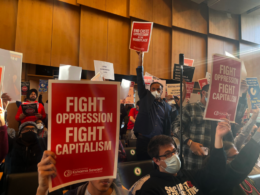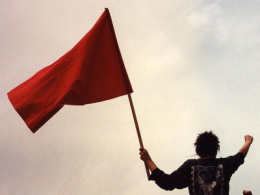By Laura Fitzgerald
The femicide of 23 year-old teacher Ashling Murphy on 12 January 2022, cutting a young life callously and brutally short, provoked a mass response. In a moment replete with profound sadness, anger and solidarity: anger at the social ill of men’s violence against women in all its forms; sadness for Ashling’s family, for the children in Ashling’s class who lost their teacher; tens of thousands, probably upwards of 100,000, congregated in countless vigils in every nook and cranny of the island in cities, towns, housing estates, a myriad of sporting clubs etc. The government felt under pressure and pledged “a zero-tolerance policy to tackle domestic, sexual and gender-based violence”. Nothing concrete has yet been delivered, however.
At the time, Socialist Party activists working as part of ROSA – Socialist Feminist Movement, tried to channel that moment when the spotlight was shone on gender-based violence in all its forms, into building a new active and organised mass campaign and movement. Ruth Coppinger and ROSA sponsored an online conference inviting a wide range of speakers with a view to trying to help foment such a process. None of the events and actions we were able to organise was enough to bring this into fruition.
Furthermore, at the Stand Out that ROSA organised in Smithfield, Dublin 7 at the time, when a representative of the Socialist Party and ROSA addressing the crowd said that “the movement that we must build has no room for racism and no room for transphobia… Racism and transphobia are inextricable from sexism… and we stand against all of them together and united”, she was met with resolute applause.
Lies and hypocrisy on gender-based violence
Events just one year later illustrate the prescience of these stances and initiatives. January 2023 was characterised by a series of escalating mobilisations, organised by far-right groups and fascists, against refugees. While mostly small, sporadic, and opposed by the vast majority of ordinary people (70% in an Irish Times/Ipsos MRBI poll stated that protests “should not be allowed in front of Direct Provision centres”), these despicable actions were able to tap into a minority of demoralised and alienated sections of some of the most deprived working-class communities.
The situation worsened in Finglas in late January when a harrowing incident of on-street sexual violence against a young woman was cynically used by far-right agitators to whip up localised anti-refugee protests of many hundreds and was linked to an unprovoked violent attack by racist thugs wielding a baseball bat on a small encampment of homeless migrant men in nearby Ashtown.
Tapping into racist tropes about black and brown men, the myth that the perpetrator was a non-national or a person of colour went viral, and the cocktail of alienation, anger over brutal conditions from housing to gender-based violence, and the prevalence of racist ideas proved fertile ground for sinister far-right instigators. The developments were so serious that it provoked the Gardaí to release a statement that confirmed that they were in fact searching for a white, Irish male suspect in relation to the attack.
The contrast is stark between the mobilisations triggered by an incident of men’s violence against women in January 2022 and January 2023, progressive and reactionary respectively.
A movement to stop gender-based violence
This begs the question of what kind of struggle needs to be waged to curb and end gender-based violence. Such a struggle of course needs to stand squarely against successive governments that have chronically underfunded refuges, public housing, counselling and health services, making life for survivors even more difficult, and putting up yet more roadblocks for those mired in the psychological torture at the heart of an abusive relationship.
It’s necessarily a struggle against the misogynistic state that reproduces sexism again and again; including prevalent victim-blaming and character references in rape trials; an ingrained bias that demonises single parents and upholds the patriarchal family structure; and a continued entanglement with the Catholic Church that Dr Peter Boylan, former Master of the National Maternity Hospital, has deemed to be deepening: “a new church-State nexus has emerged. This link is based… on an alignment of the interests of government economic policy with the Church’s ownership of land and valuable health and education assets.”
Fundamentally, it’s a struggle against the very system itself. The right-wing is engaged in a concerted backlash against the feminist and LGBTQ wave that emerged globally in the past decade. This is to try to crush these struggles and the hope that they bring, but also it’s because the gender-binary and backward gender roles are needed by the capitalist system – including via the patriarchal family structure because of its role in reproducing the labour force for capitalism.
Such a struggle and movement should set about forcing the government to deliver on immediate trebling of refuge places, free counselling for survivors who want it, massive investment in public housing and more; and also should be consistently advocating for and seeking to organise as wide as possible working-class struggle against the whole system.
A movement to fight misogyny & the far right
Simultaneously, it’s essential that the movement is also proactively raising consciousness and understanding in every way of the reality of men’s violence against women and queer people, of awareness of abuse dynamics etc. This is empowering for survivors and any potential victims. Part of this of course will involve challenging everyone to consider their own behaviour and approach towards other human beings, including in their own personal relationships, particularly but not exclusively encouraging an examination of how the patriarchal nature of capitalist culture in which men dominating women and non-binary people is widespread, affects us all.
In turning outward to campaign and struggle for deep-rooted social change, including demanding public housing, secular and public health and education etc, and simultaneously raising awareness about the reality of gender violence, a bulwark can be built against the far right and their ability to disgustingly manipulate the issue.
Crucially, this involves spreading the fact that most victims of gender-based violence know the perpetrator (83%) – usually a partner or ex-partner, or family member. Gender-based violence has nothing to do with nationality, racial or ethnic background, or migration status. Connected with proximity and with sexist and other power differentials, it has everything to do with the misogyny and transphobia that is in fact embedded in far-right ideology.
Far-right individuals and groups campaign to ban abortion, marriage equality and divorce, and would happily chain women in domestic servitude – just look at Justin Barrett, leader of the National Party with his history inside Youth Defence, an organisation of violent anti-choice zealots, as well as his links to known Nazis.
Straight out of the Ku Klux Klan playbook
In fact, we have to spread the word that the far-right has decades-long form in seeking to weaponise violence against women to push their racist and misogynistic bile.
Socialist feminists have always taken a stand against this. In 1932, a year before her death at age 75, Clara Zetkin, German Marxist-feminist pioneer and founder of International Women’s Day as an exercise in global working-class feminist struggle against oppression, imperialism and capitalism, took a stand in support of the Scottsboro Boys. She excoriated “the most despicable race hatred of white against Black, this lowest expression of arrogance and low human and cultural values” that these young Black boys were experiencing as they faced the possibility of a death penalty, on account of a totally fabricated accusation of rape of two white women (one of whom later recanted and joined the Communist Party’s campaign to free the Scottsboro Boys).
The exonerated Central Park Five were Black and Latino boys wrongfully convicted of raping and assaulting a white woman in 1989. The youngest was just 14 years of age. Who used his obscene wealth to pay for full-page advertisements in four New York newspapers at the time to call for them to face the death penalty? Predator-in-Chief, Donald Trump of course!
From the KKK, to Donald Trump, to Pegida in Germany in 2016, those whose very ideology aligns with the most patriarchal elements of capitalism have sought to use gender violence to whip up racism.
Zetkin’s appeal for the working class and poor masses in the US and around the world to organise in defence of the Scottsboro Boys was infused with her understanding of the needs of the capitalist system to propagate racism: “The accusation is a conscious lie which was designed for sinister purposes by landowners and manufacturers. These forces want to … terrorise the Black masses which are rising up against their exploitation and are beginning to form a common front with their white brothers and sisters against hunger, imperialist wars and bloody white terror.”
We won’t be dragged backwards
A new wave of feminist and LGBTQIA struggle emerged in the 2010s that mobilised millions and won many victories, including abortion rights in Ireland and starting a massive societal discussion on gender violence in all its forms.
From the mythologising of misogynistic abusers like Depp and Tate; to the overturning of Roe; to the rapid escalation of transphobia; to the far-right threat in many countries; to the misery of the war-mongering, climate catastrophe and hunger that capitalism today heralds for working-class, poor and racialised women of the world – the need for socialist feminist struggle internationally could not be more urgent.
The system’s attempt to crush our struggles will not win – we won’t be dragged backwards – and we will take our movement forward in struggle on 8 March, International Women’s Day 2023 and beyond with anti-capitalism, anti-racism, the solidarity of the exploited and oppressed, and socialist feminism.












